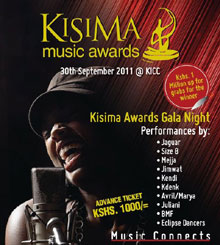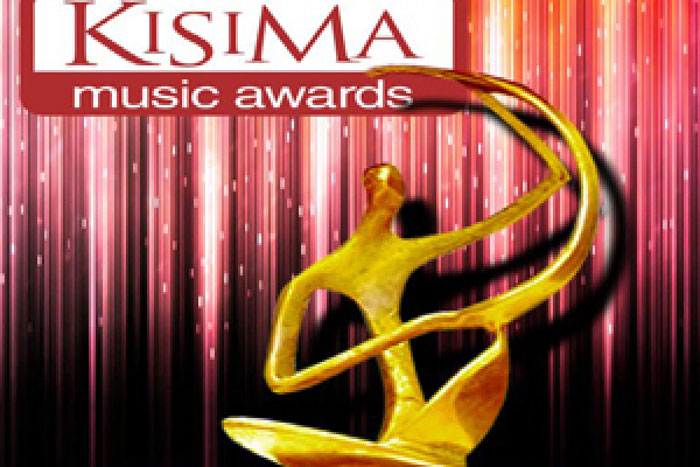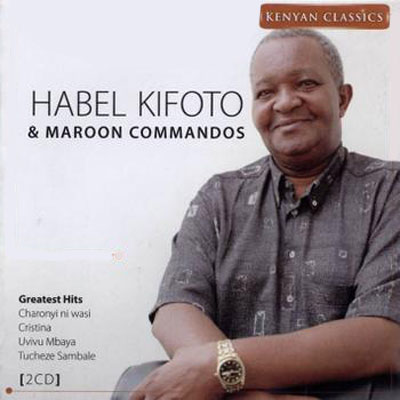A lot has been said and written about the 9th edition of the Annual Kisima Awards that went down at the KICC grounds on the 30th September 2011. And with good reason. After the horror showing that was Kisima 2009 (see HERE), kudos to the Kisima team for reviving what is a much needed event in the entertainment landscape of Kenya.
Allow me to add some thoughts to the cacophony of voices. A disclaimer first.
I am a believer in Kisima, so it pains me to be critical of it. I believe it plays an incredibly vital role in the development of this nation’s music and entertainment industry. It is not only the oldest of the awards ceremonies in Kenya, but it is the only recognized mainstream awards platform in Kenya, and even a nomination from them should be sufficient to give any local artist significant standing on the world stage.
As such, I do believe that critical questions need to be asked of their process and their production value if we are to take it to the next level. I suspect that mainstream media may have fallen over themselves over the huge cash prize on offer, and forgotten about real journalism. I do not pretend to be an expert, but I would like to present my honest critique of the 2011 Kisima Awards.
WINNERS
I make no bones about my bias for Gospel. I have been an excited observer as the profile of Gospel music has grown in Kenya (subject of another forthcoming article). As such, to see Gospel artists claim a near clean sweep of the awards was very rewarding. Kisima’s 2011 theme was “Music Connects”: it might as well have been “The Year Of Gospel Music”. Gospel acts bagged seven out of a possible ten awards on offer. To put it in perspective, there was not a single category where a Gospel act was nominated where they did not proceed to win. Reggae (Kevoh Yout). Benga (Mbuvi). Most promising (BMF). Hip-Hop (Juliani). Collaboration (MOG, Mr. Seed). Artist/Group of the year (Juliani). See full list HERE .
Sauti Sol were the other big winners of the night, walking away with Fusion Artist and Video of the Year after their “Coming Home” single became a run-away success.
PROCESS CRITIQUE
Kisima Awards has enjoyed a track record of transparency and unambiguity. Discerning minds do not often call their processes into question, and with good reason. They have been free and forthcoming with information for both the public and the press, giving great peace of mind to all. 2011 was a little odd in this respect. In a sense, there is a moral burden of proof that rests with organizers of such events. Public disclosure of vital information helps the public understand how critical decisions are made, and why.
Here’s an instance relating to how this could have worked out. Kisima Awards 2011 has a launch event. There they state that 32 categories would be rolled out, same as 2009 (see 2009 nominees/winners list). Final nominees list is released with what may very well be an all-time low of only 12 categories. This may seem a little counter-intuitive, given that the industry is not atrophying, but growing. Yet no one in the media asks about this, and the Kisima think-tank give no answers. The public and industry are left in limbo.
Exhibit two. Kisima departs from its tried and tested public voting system to one where a select few make the calls. Now there’s nothing wrong with this system, IF you get the right people to make the ultimate decisions. What does the public know about who is in the Kisima Academy and what their credentials are? Next to nothing? The Kisima website is surprisingly mum about what ought to be an obviously vital piece of information. All we know is that the chairperson of this academy is a university professor of ethics. Fortunately I personally know this gentleman, and believe him to be a person of the highest integrity. But should the public begin to ask why the chair of the academy has few discernible ties to the industry over which he presides as judge and jury, who would placate them?
Am I questioning the process? Not at all. But Kisima has failed an important test – the public disclosure and accountability test. If I know so little about the inputs, how can I trust the outputs? Legitimate question. On to production.
PRODUCTION CRITIQUE
 If Kisima failed in their 2011 process, their production of the event was positively mediocre: more is expected of one of Kenya’s oldest and more prestigious awards showcases. An expected 7pm start turned into a 9:40 kick-off. That should have been a huge red flag, and indicator of what was to come.
If Kisima failed in their 2011 process, their production of the event was positively mediocre: more is expected of one of Kenya’s oldest and more prestigious awards showcases. An expected 7pm start turned into a 9:40 kick-off. That should have been a huge red flag, and indicator of what was to come.
I don’t think anyone could have seen the incredulity of the opening act from miles away. Jimwat and Kendi were not a bad choice to get the show on the road, but their choice of song definitely was. A song in praise of a local city council leader, who was not only an event ‘sponsor’, but also a very likely candidate for the Nairobi Governorship come 2012, was a train-wreck of a disaster. Jimwat singing praise about some random political wannabe at such a distinguished musical showcase was one thing, but his shameless plug asking us to vote for said politician come 2012 was brazenly disgraceful and beneath him. Political prostitution of the highest order. And with an election year beckoning, this cannot bode well for the sanctity of our industry.
Another kill-me-quick moment was around the corner. A regrettable bastardization of what should have been a magic moment followed when not once, but twice, an irritated audience was made to stand in a moment of tribute to the late great Nobel winner Wangari Maathai. Great idea. But when you pull it off twice in one event, how can that not stink of disrespectful opportunism?
Kisima selected what seemed to be a clever choice of MCS – the beautiful Chichi Seii, the humourousSolo (Capital FM) and the stately Swahili news anchor Ahmed Dharwesh. They had some wonderful moments of lively and humourous interaction with the audience, and sparkled in turn. Yet as the evening wore on, it was apparent that they did not have a script, and eventually each of them began to drag the event in the direction they saw fit. An incoherent and disjointed event was the result.
Transitions were tedious. Often times a full couple of minutes would pass between the introduction of a performing artist and the actual set. Other times artists would come onto stage with absolutely no introduction, leaving a puzzled crowd trying to figure out who was before them. A particularly embarrassing moment came when one of the MCs could not be located, leaving the others to start calling out for them from stage. Ouch!
Even what should have been the highlight of the event, the posthumous handing over of the lifetime achievement award to the legendary Habel Kifoto, founder of Maroon Commandoes, was botched. Such a shallow and poorly thought through tribute to such a musical giant was painful to endure.
And for an event designed to uplift music standards, the number of lip-syncing performances was more than a little disturbing. There sat the contracted Kisima band, on the sidelines, as act after act came on and sang over their tracks.
Did I mention there was a totally random and completely nonsensical fashion show smack in the middle of the event? Epic fail. Goes to show what happens when you jump into bed with sponsors who do not share your vision.
Still, there were a number of genuine stand-out live performances – BMF, Dola Kabarry, Juliani and especially Jaguar come to mind.
SO WHAT?
Once again, I applaud the fact that Kisima has made a return onto the scene. Yet my humble suggestions would be this. One. Outsource the production of the event. Look for a qualified and successful event producer with a track record of delivering unforgettable productions. Two. Don’t tinker too much with your process year to year. And if you feel the need to make some changes, never underestimate the power of information. Remember where the burden of proof lies. And three. Please, whatever you do don’t turn our artists into prostitutes.



One thought on “Kisima Awards 2011 – A Critical Look”